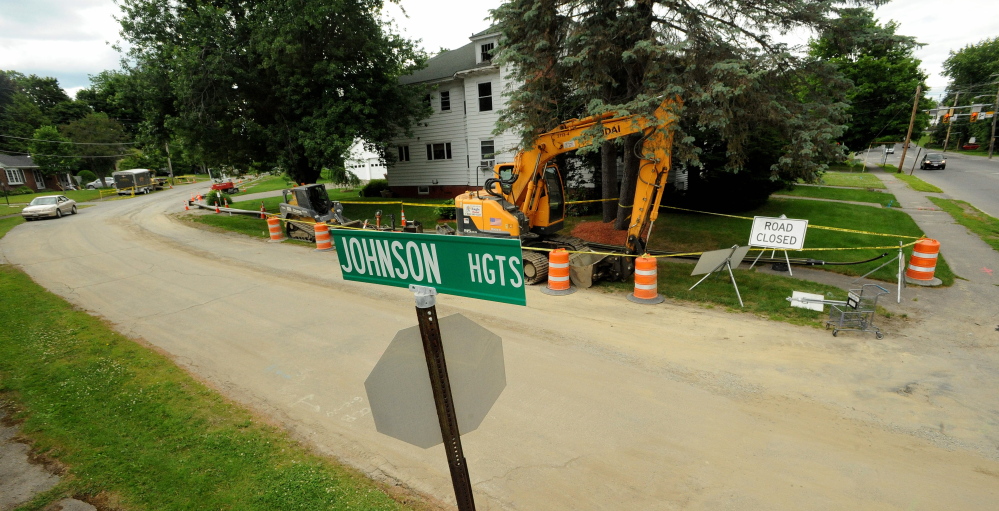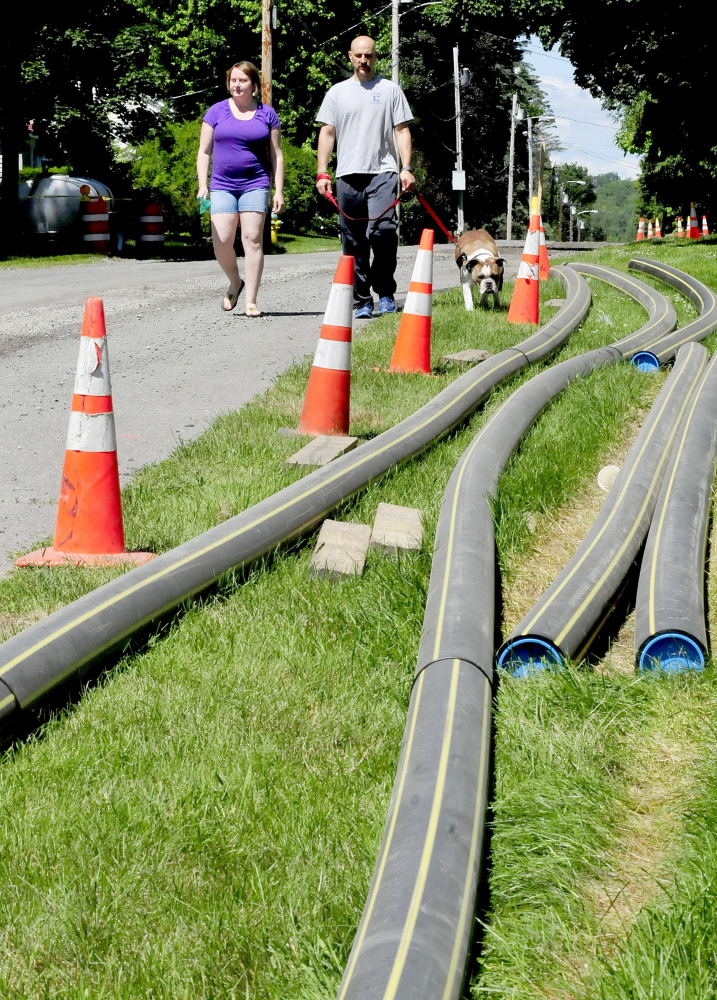WATERVILLE — Bruce Olson looks forward to having natural gas at The Center, a large downtown building that houses the Waterville Opera House ticket office, the Maine Made & More Shop and other businesses, as well as some city offices and the City Council chambers.
“It’ll be clean, it’s efficient and it’s going to save us money,” Olson, the building manager, said Friday. “It’s just a win-win-win for us, in every way possible.”
Likewise, Peter Burgher and Dennis Ratner, owners of a large building on Elm Street that houses psychology practices, say they also plan to hook up to natural gas.
“It’ll save between $1,000 and $2,000 a year,” Burgher said.
As Summit Natural Gas of Maine lays lines for natural gas on main roads and residential streets in the city this summer, people are weighing their options. Should they convert their existing oil burners to natural gas or install new burners? Or should they wait it out and continue to burn oil or propane, supplemented by wood stoves, wood pellet stoves or gas and electric heaters?
Some city residents already have decided and have stacks of pipe on their front yards, waiting to be installed underground.
It was an easy decision for Olson. He also plans to switch to natural gas at the Pleasant Street home he shares with Waterville Mayor Karen Heck.
“We have some propane appliances at the house — stove, dryer,” he said. “We have oil and propane now and both have to be delivered. We’ll be able to turn everything over to natural gas. It’s going to be cheaper, no question about it. We’ll have to put in a new boiler, but we’ll get an increase in efficiency and we’ll pay less per BTU because it’s less expensive than No. 2 fuel.”
On average, homeowners who switch from No. 2 heating oil to natural gas would save nearly $1,100 per year in energy costs if using standard boilers or furnaces, according to data from Gov. Paul LePage’s energy office.
Inland Hospital, Thomas College and Huhtamaki are among Waterville locations already using natural gas. Workers were digging Friday on Johnson Heights, off Main Street in the city’s North End, in anticipation of connecting to MaineGeneral’s Thayer Center for Health on nearby North Street.
Summit, a subsidiary of Colorado-based Summit Utilities, is building a pipeline originating in Windsor and reaching from Richmond to Madison at an estimated cost of $350 million, with a focus on commercial and residential customers. The company hopes to serve 15,000 residential customers from Madison to Richmond by the pipeline’s third year of operation.
Olson said he also thinks that, in addition to realizing a savings, the use of natural gas will increase comfort levels because the system will run more efficiently.
While natural gas prices are generally cheaper than that of oil, that is not a reason to choose natural gas right away, proponents of oil and propane use say.
Jamie Py, president of Maine Energy Marketers Association, advises people to talk to their local energy company before making a decision to convert. They also should consider updating their current heating system, reducing usage, weatherizing their homes, using space heating appliances such as propane or wood pellet stoves, understand all the costs associated with converting to natural gas and consider that natural gas prices could change, Py said.
“We’re just saying that it’s not an easy and simple thing,” he said of converting to natural gas.
The marketers association has 340 members, about 180 of which are retail propane heating and oil companies, he said. The rest are associate members, which include heating ventilation and air conditioning businesses. The association recently developed a new website, MaineEnergyIQ.com, which Py said is designed to help people understand and choose their energy options.
The website claims heating oil or propane can serve people’s needs as well as, if not better than, natural gas.
Py said current natural gas prices are low, but no one knows whether they will stay that way or move more in line with heating oil prices.
“My guess is that those prices will come closer together,” he said.
Good propane prices also are available, he said. “We’re seeing, over the past few years, really low prices on propane,” he said.
There are also upfront costs to converting to natural gas. Building a service line from the street to a home can cost around $6,000, and Summit offers to reimburse up to about $6,600. But converting the house itself is also usually a $6,000 expense — $1,800 for labor and $4,200 for parts. Customers have to pay for most of that, though Summit offers up to a $1,500 rebate for customers looking to buy a new, high-efficiency boiler or furnace and water heater. Residents who qualify for the federal Low Income Home Energy Assistance Program are eligible for up to $4,000 to convert to natural gas, according to Summit.
Meanwhile, Ratner said he and Burgher converted their professional office building from oil to propane about five years ago in an effort to realize savings and now will convert from propane to natural gas.
Ratner said the cost of conversion from propane to natural gas will be minimal.
“Now that natural gas is here, we have another chance to improve the system,” he said.
Olson said he expects natural gas will be at The Center downtown by the beginning of the heating season this year. He looks forward to not having to deal with deliveries of propane and oil, which The Center now uses. Natural gas will flow right into the building, he said.
“We will proceed as though we are going to have natural gas at the beginning of the heating season,” Olson said. “If we don’t, we have propane there. We’re going to put in two brand-new boilers in the building, and we could change them to propane and swap over to natural gas later.”
He said natural gas is a cleaner fuel than oil and pollutes less.
“That’s the way the rest of the country is,” he said. “The Northeast is sort of the last holdout for fuel oil. Everyone else has natural gas and heat pumps. It’s everywhere else, and there’s a reason for that. It’s cheaper and it’s convenient.”
Amy Calder — 861-9247
Twitter: @AmyCalder17
Send questions/comments to the editors.





Success. Please wait for the page to reload. If the page does not reload within 5 seconds, please refresh the page.
Enter your email and password to access comments.
Hi, to comment on stories you must . This profile is in addition to your subscription and website login.
Already have a commenting profile? .
Invalid username/password.
Please check your email to confirm and complete your registration.
Only subscribers are eligible to post comments. Please subscribe or login first for digital access. Here’s why.
Use the form below to reset your password. When you've submitted your account email, we will send an email with a reset code.